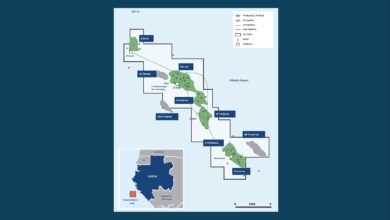International oil companies (IOCs) should pursue opportunities to create and solidify partnerships with national oil companies (NOCs) and internationalizing national oil companies (INOCs) to ensure access to more difficult reservoirs, said Chris Ross, Charles River Associates, at the Offshore Technology Conference on 3 May 2010. He spoke at the topical breakfast session, “The Shape of the Industry to Come: Changing Roles and Responsibilities.”
“IOCs will need to choose partners that need their competencies in both technology and complex project management … to develop their more difficult resources and master the social performance management required to operate under global scrutiny in difficult political environments,” Mr Ross said.
He believes that IOCs still have many growth opportunities in North America, where the transparent fiscal regime and established contract framework enable a structure where IOCs can be highly competitive. Areas such as the Bakken in North Dakota, oil sands in Canada and even the mature Gulf of Mexico still provide development opportunities.
However, as easy-to-reach resources are depleted, IOCs need to look to difficult resources and new ways to extract them. IOCs can transport the technologies they develop in the US to overseas markets by partnering with INOCs and NOCs, Mr Ross said.
“IOCs are often not the leaders in opening up new provinces, but they are quick to deploy their financial, technological and project management capabilities to build large-scale positions in new resources,” he said.
But this task might not be so easy.
“There has been a certain wistful and wishful thinking that countries might open up ‘easy’ resources to foreign investments, as they did in the 1990s,” he said. However, most NOCs now have the ability to develop their own resources, without help from IOCs.
“The IOC’s role is where their scale, financial and technical competencies are most valuable in developing difficult resources in often difficult places,” Mr Ross said. By partnering with NOCs, IOCs would be able to enhance their positions in multiple countries around the world.
Mr Ross described the evolution of roles within the energy industry:
• NOCs will be stewards to national hydrocarbons endowment and play an important role in developing and diversifying their national economies by maximizing value of the resources over the long haul. NOCs have a role to anchor new industrial development clusters in many countries because they are a source of management capabilities and technical competencies;
• INOCs will “buy their way in” to established business ecology by bidding high at lease sales and building infrastructure (roads, bridges, ports);
• IOCs are evolving toward a focus on the most difficult resources and on strengthening their value proposition to difficult operating environments. This includes addressing the socio-economic environment as well;
• Independents will continue to open new basins and try new concepts as they always have;
• Oilfield service companies will continue to diversify their client bases and product lines to offer integrated services to some NOCs and more tailored offerings to mature NOCs, IOCs and INOCs.
Access to resources is getting more difficult, Mr Ross said, but “the name of the game is difficult location, difficult resources. Get used to it.”




